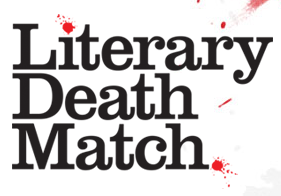Writing a novel involves (OK, big understatement coming up) many challenges.
Sure, there’s the writing itself: wading your way through the dark, watery tunnel that is a long-ish piece of fiction. There’s the doubt: wondering if you can do it, wondering if it all somehow ties together (probably not), wondering if you should just chuck this book and work on something else.
And, too, there’s the myriad distractions from writing, some of which are important (the dishes need to be done, we just ran out of toilet paper) and some of which are not (Facebook, checking email; Facebook, checking email).
Then there’s the non-writing stuff. Like answering the inevitable question about your novel: “What’s it about?”
In general, I try to avoid the subject of my writing all together. When that tactic fails, I’m usually vague (“Oh, I’m scribbling away. Making progress. Slowly but surely.”).
Sometimes, however, I get asked the question and I have to say something.
The next tactic is to then be flip: “It’s about 438 pages.”
And if that doesn’t satisfy I start rambling: “It’s about a family, there are multiple points of view, lots of characters, it takes place in Los Angeles, in 1999, the key thing about the family, though, is the daughter who…”
And I start to get down on myself. I should have my go-to elevator pitch description (you know, something like: It’s a heart-warming story of a boy’s coming of age in World War 2-era Kansas.). It should be brief. It should be compelling. But because my novel is 438 pages (the number goes up or down on a daily basis) it’s hard to distill a coherent summation into a tiny, easily digestible sound bite.
Part of it, too, I know, is not wanting to talk about my novel until it’s done. I’m superstitious that way.
So maybe, hopefully, when it’s done, I’ll have a little distance and be able to better summarize what my novel is about. I won’t ramble on so much.
Hopefully. Maybe.

